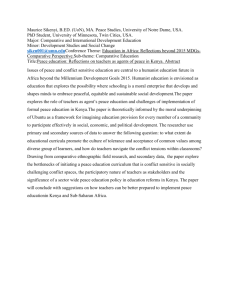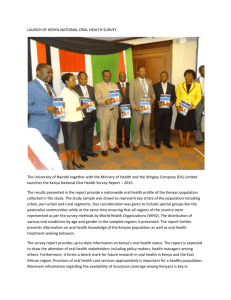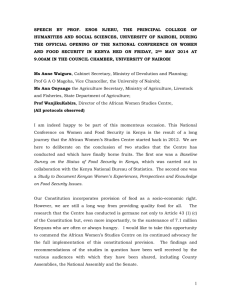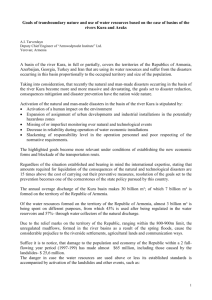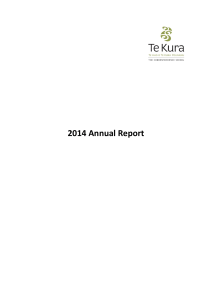ADditional Information - Amnesty International USA
advertisement
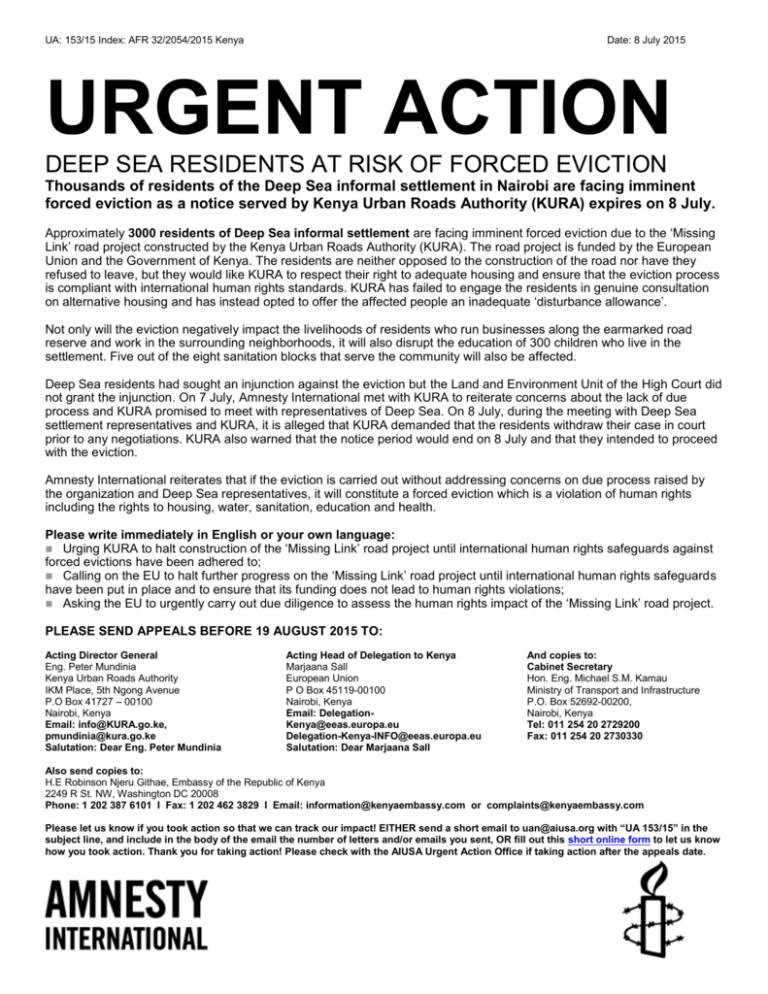
UA: 153/15 Index: AFR 32/2054/2015 Kenya Date: 8 July 2015 URGENT ACTION DEEP SEA RESIDENTS AT RISK OF FORCED EVICTION Thousands of residents of the Deep Sea informal settlement in Nairobi are facing imminent forced eviction as a notice served by Kenya Urban Roads Authority (KURA) expires on 8 July. Approximately 3000 residents of Deep Sea informal settlement are facing imminent forced eviction due to the ‘Missing Link’ road project constructed by the Kenya Urban Roads Authority (KURA). The road project is funded by the European Union and the Government of Kenya. The residents are neither opposed to the construction of the road nor have they refused to leave, but they would like KURA to respect their right to adequate housing and ensure that the eviction process is compliant with international human rights standards. KURA has failed to engage the residents in genuine consultation on alternative housing and has instead opted to offer the affected people an inadequate ‘disturbance allowance’. Not only will the eviction negatively impact the livelihoods of residents who run businesses along the earmarked road reserve and work in the surrounding neighborhoods, it will also disrupt the education of 300 children who live in the settlement. Five out of the eight sanitation blocks that serve the community will also be affected. Deep Sea residents had sought an injunction against the eviction but the Land and Environment Unit of the High Court did not grant the injunction. On 7 July, Amnesty International met with KURA to reiterate concerns about the lack of due process and KURA promised to meet with representatives of Deep Sea. On 8 July, during the meeting with Deep Sea settlement representatives and KURA, it is alleged that KURA demanded that the residents withdraw their case in court prior to any negotiations. KURA also warned that the notice period would end on 8 July and that they intended to proceed with the eviction. Amnesty International reiterates that if the eviction is carried out without addressing concerns on due process raised by the organization and Deep Sea representatives, it will constitute a forced eviction which is a violation of human rights including the rights to housing, water, sanitation, education and health. Please write immediately in English or your own language: Urging KURA to halt construction of the ‘Missing Link’ road project until international human rights safeguards against forced evictions have been adhered to; Calling on the EU to halt further progress on the ‘Missing Link’ road project until international human rights safeguards have been put in place and to ensure that its funding does not lead to human rights violations; Asking the EU to urgently carry out due diligence to assess the human rights impact of the ‘Missing Link’ road project. PLEASE SEND APPEALS BEFORE 19 AUGUST 2015 TO: Acting Director General Eng. Peter Mundinia Kenya Urban Roads Authority IKM Place, 5th Ngong Avenue P.O Box 41727 – 00100 Nairobi, Kenya Email: info@KURA.go.ke, pmundinia@kura.go.ke Salutation: Dear Eng. Peter Mundinia Acting Head of Delegation to Kenya Marjaana Sall European Union P O Box 45119-00100 Nairobi, Kenya Email: DelegationKenya@eeas.europa.eu Delegation-Kenya-INFO@eeas.europa.eu Salutation: Dear Marjaana Sall And copies to: Cabinet Secretary Hon. Eng. Michael S.M. Kamau Ministry of Transport and Infrastructure P.O. Box 52692-00200, Nairobi, Kenya Tel: 011 254 20 2729200 Fax: 011 254 20 2730330 Also send copies to: H.E Robinson Njeru Githae, Embassy of the Republic of Kenya 2249 R St. NW, Washington DC 20008 Phone: 1 202 387 6101 I Fax: 1 202 462 3829 I Email: information@kenyaembassy.com or complaints@kenyaembassy.com Please let us know if you took action so that we can track our impact! EITHER send a short email to uan@aiusa.org with “UA 153/15” in the subject line, and include in the body of the email the number of letters and/or emails you sent, OR fill out this short online form to let us know how you took action. Thank you for taking action! Please check with the AIUSA Urgent Action Office if taking action after the appeals date. URGENT ACTION DEEP SEA RESIDENTS AT RISK OF FORCED EVICTION ADDITIONAL INFORMATION Deep Sea is an informal settlement in Nairobi with close to 12,000 residents. It is one of the safer informal settlements in Nairobi, and it provides a springboard for people to slowly improve their economic well-being and raise their families. This community has been under the threat of forced eviction since 2009, when they first heard that the Kenya Urban Roads Authority (KURA) with the funding of the European Union (EU) and the Government of Kenya would be undertaking the ‘Missing Link’ road construction project. The road would pass through the trading center and main road at Deep Sea affecting a quarter of the population in the area. KURA held a meeting with Deep Sea residents on 27 June to inform them that they had until 8 July to move from the settlement. Deep Sea residents have been excluded from the development of a resettlement plan and discussions regarding compensation. The ‘disturbance allowance’ that KURA is offering is not based on an assessment of the impact of the eviction including on some marginalized sectors of the community. The compensation offered is inadequate to allow affected members to recoup their losses, and find alternative housing that is secure with access to essential services like water and sanitation. Deep Sea residents have little information on how or when residents’ complaints will be addressed or what remedies will be provided. Although KURA has had some engagement with Deep Sea residents, as a government agency, it has so far fallen short of the due process it is required to follow under Kenya’s international human rights obligations. Kenya is obliged under a range of human rights treaties, including the International Covenant on Economic, Social and Cultural Rights, the International Covenant on Civil and Political Rights and the African Charter on Human and Peoples’ Rights, to refrain from and prevent forced evictions. The UN Committee on Economic, Social and Cultural Rights has emphasized that evictions may be carried out only as a last resort, once all feasible alternatives have been explored and only after appropriate procedural and legal safeguards are in place. These include genuine consultation with the people affected, adequate and reasonable notice, adequate alternative housing and compensation for all losses, safeguards on how evictions are carried out, and access to legal remedies and procedures, including access to legal aid where necessary. Governments are required to ensure that no one is rendered homeless or vulnerable to other human rights violations as a consequence of an eviction. Under international law, the EU is also obligated to ensure that its funding is not used to violate human rights. Under the Treaty on the EU, the European Commission’s action on the international scene shall be guided by, among other things, respect for international law and human rights. The Treaty on the Functioning of the EU in the context of development cooperation states that the EU and member states shall comply with the commitments they have approved in the context of the UN and other competent international organizations. The EU has so far failed to ensure adequate human rights protections in this project. It must engage with the Kenyan government to ensure that the project does not lead to further human rights violations. Name: Deep Sea residents Issues: Forced eviction, Legal concern, Economic social and cultural rights UA: 153/15 Issue Date: 8 July 2015 Country: Kenya UA Network Office AIUSA │600 Pennsylvania Ave SE, Washington DC 20003 T. 202.509.8193 │ F. 202.675.8566 │E. uan@aiusa.org │ amnestyusa.org/urgent

